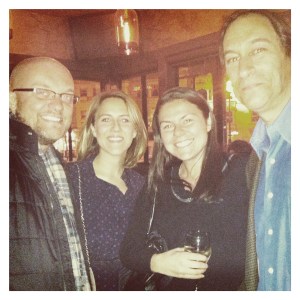San Francisco Happy Hour Brings Together Urban Innovators

Who will you meet?
Cities are innovating, companies are pivoting, and start-ups are growing. Like you, every urban practitioner has a remarkable story of insight and challenge from the past year.
Meet these peers and discuss the future of cities in the new Meeting of the Minds Executive Cohort Program. Replace boring virtual summits with facilitated, online, small-group discussions where you can make real connections with extraordinary, like-minded people.
Last night a group of like-minded urban sustainability geeks gathered at a bar in San Francisco for the first Meeting of the Minds happy hour.
The meet-up brought together approximately 30 people working in or interested in urban planning, sustainable development, renewable energy, transportation, smart and connected cities, as well as innovations in any of these areas.
In a digital age where social networking happens more online than at the local watering hole, we rarely get to just relax, have a drink, and meet people who pique our interests. Last night demonstrated that we all crave a bit of face-to-face interaction with other passionate people in a laid-back setting.
A few highlights of the Minds who attended demonstrate what a hot-bed San Francisco has become in the field of urban sustainability.
Clara Brenner and Julie Lein

Clara Brenner & Julie Lein of Tumml talk with filmmaker Ron Blatman and MotM Dir. of Communications Dave Hahn
Clara Brenner and Julie Lein are the co-founders of Tumml, a new urban ventures accelerator that empowers entrepreneurs to help solve urban challenges. Tumml will host its first cohort of companies during the summer of 2013. Clara and Julie graduated in 2012 from the MIT Sloan School of Management. Follow them on twitter @Tumml.
Ron Blatman
Ron Blatman is producing a new show called Saving the City: Remaking the American Metropolis. The national TV series will feature four one-hour programs highlighting successful and unsuccessful examples of urban redevelopment throughout the US and Canada. The TV component is only part of a much larger education effort to raise awareness about the importance of cities and the quality of the urban environment through film, lesson plans and a national outreach agenda. Visit savingthecity.org for more on the project — the TV Series section has outlines of all four episodes. The recently launched Facebook page is Facebook.com/SavingtheCityTV.
Mike Boss
Mike Boss is the General Manager at Rock & Rose Landscapes in San Francisco. Mike is working on a new start-up concept that plans to “make traditional turf obsolete.” Turf and grass are the most water and energy intensive components of landscaping and use the most pesticides. Mike and his partner believe they can solve this challenge and are working on a bio-diverse plant alternative to turf that is reminiscent of the historic meadows in the United States. They are currently looking for funders and developing a business plan.

Cisco Director and MotM co-founder Gordon Feller takes a photo with San Francisco urban planner Jenny Fogarty.
Paul Vosbeek
Paul Vosbeek (Founding Partner of Real Energy Inc., pictured above) and his team from OrangeGoesGreen are building a green and clean energy cluster. OrangeGoesGreen is a private-public partnership initiative harnessing economic diplomacy, promotional activities and the transfer of knowledge between Dutch and North-American government agencies, knowledge institutes and companies. The primary goal is to secure business deals for the members and partners involved. OrangeGoesGreen is focused on the US and Canada, who, together, are the world’s largest investor in renewable energy and sustainability. The west coasts of the US and Canada, in particular, are leading the way with ambitious renewable portfolio standards and emission trading systems. Over three years, a minimum of 15 projects will be developed. For each project, a complementary combination of partners will be aligned to provide a complete value-chain solution. The OrangeGoesGreen program is a model for a new and innovative approach to doing business in the international arena. If the program is successful, it will serve as a model for future public-private partnerships with the government of the Netherlands.
Sean Randolph
Sean Randolph, President and CEO of the Bay Area Council Economic Institute has launched a new website called Global Green Cities. This site presents the best thinking and analysis on sustainable urbanization and green growth in cities and regions around the world, and provides connections to ongoing discussions that define the state of the art in green city design and planning. They also just released a new report on Global Green Cities summarizing the findings from their last symposium (links to PDF report).
Discussion
Leave your comment below, or reply to others.
Please note that this comment section is for thoughtful, on-topic discussions. Admin approval is required for all comments. Your comment may be edited if it contains grammatical errors. Low effort, self-promotional, or impolite comments will be deleted.
Read more from MeetingoftheMinds.org
Spotlighting innovations in urban sustainability and connected technology
Middle-Mile Networks: The Middleman of Internet Connectivity
The development of public, open-access middle mile infrastructure can expand internet networks closer to unserved and underserved communities while offering equal opportunity for ISPs to link cost effectively to last mile infrastructure. This strategy would connect more Americans to high-speed internet while also driving down prices by increasing competition among local ISPs.
In addition to potentially helping narrow the digital divide, middle mile infrastructure would also provide backup options for networks if one connection pathway fails, and it would help support regional economic development by connecting businesses.
Wildfire Risk Reduction: Connecting the Dots
One of the most visceral manifestations of the combined problems of urbanization and climate change are the enormous wildfires that engulf areas of the American West. Fire behavior itself is now changing. Over 120 years of well-intentioned fire suppression have created huge reserves of fuel which, when combined with warmer temperatures and drought-dried landscapes, create unstoppable fires that spread with extreme speed, jump fire-breaks, level entire towns, take lives and destroy hundreds of thousands of acres, even in landscapes that are conditioned to employ fire as part of their reproductive cycle.
ARISE-US recently held a very successful symposium, “Wildfire Risk Reduction – Connecting the Dots” for wildfire stakeholders – insurers, US Forest Service, engineers, fire awareness NGOs and others – to discuss the issues and their possible solutions. This article sets out some of the major points to emerge.
Innovating Our Way Out of Crisis
Whether deep freezes in Texas, wildfires in California, hurricanes along the Gulf Coast, or any other calamity, our innovations today will build the reliable, resilient, equitable, and prosperous grid tomorrow. Innovation, in short, combines the dream of what’s possible with the pragmatism of what’s practical. That’s the big-idea, hard-reality approach that helped transform Texas into the world’s energy powerhouse — from oil and gas to zero-emissions wind, sun, and, soon, geothermal.
It’s time to make the production and consumption of energy faster, smarter, cleaner, more resilient, and more efficient. Business leaders, political leaders, the energy sector, and savvy citizens have the power to put investment and practices in place that support a robust energy innovation ecosystem. So, saddle up.






0 Comments